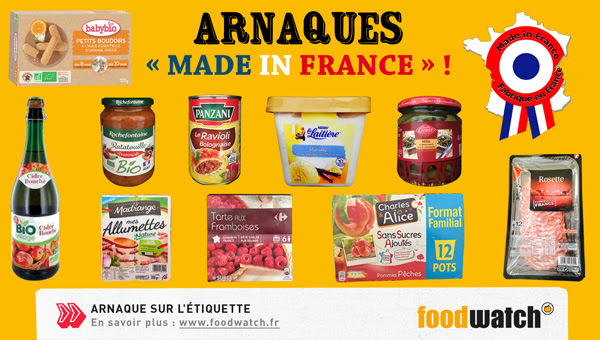Following an alert issued by the NGO on “Made in France” scams in food, a manufacturer announces the end of the marketing of its misleading product.

This is a timid victory, but it shows the usefulness of associations specializing in food transparency. In mid-July, Foodwatch denounced the deception induced by the “Made in France” logos on a large number of food packaging. While the “blue-white-red” label seems to reassure consumers about the origin of the food they buy, the NGO demonstrated the scam behind this display.
Foodwatch indeed pinned a dozen characteristic products of this lure. Packaged in France, the products actually came from other countries, and sometimes even from other continents.
French-Indian pickles
“The cockade of the great anything goes to these Charles Christ pickles stamped” blue-white-red “accompanied by the mention” conditioned in the Loir-et-Cher “, noted the NGO. But the origin of vegetables is surprising: the pickles grown in India have in fact crossed half of the planet before reaching our shelves ”.
An unacceptable situation, while nine in ten French people say they are ready to pay a little more to consume French and have more guarantees on the origin and traceability of the products consumed. “All departments and all ranges” are affected by this scam, said Foodwatch.
“Lead to confusion”
A few weeks later, the investigation carried out by the association seems to have borne fruit. One of the pinned brands announced the end of the marketing of its supposedly “Made in France” pickles. The NGO announced it in a press release on Friday.
“In a letter addressed to foodwatch, the head of the Reitzel group which markets this product recognizes” that these references may cause confusion “and indicates that these pickles will no longer be marketed. The group now intends to promote a product that is more compliant with the packaging: “100% French pickles, which allows us to display blue-white-red on the labeling”, emphasizes Emmanuel Bois, Managing Director of Reitzel “, cited by Foodwtach.
The NGO is delighted with this decision and underlines that it is “possible to be honest about the labeling made in France” and thus to strengthen transparency – and thereby food safety. “The nine other manufacturers pinned by foodwatch (Charles and Alice, Panzani, Carrefour, Madrange …) have, to our knowledge, still not reacted”, she specifies.

.















